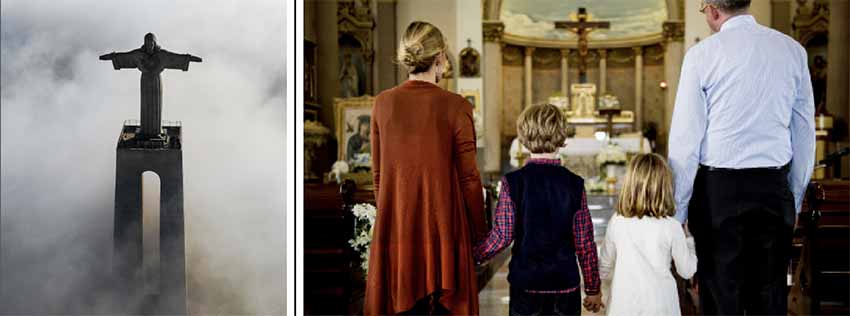 The Trinity is often left out of our prayer as we focus on either God, Jesus or the Holy Spirit, rather than the mystery of how they all come together. But does it have to be that way? In this Explorations, we explore how the Trinity can help bring us into a deeper relationship with God.
The Trinity is often left out of our prayer as we focus on either God, Jesus or the Holy Spirit, rather than the mystery of how they all come together. But does it have to be that way? In this Explorations, we explore how the Trinity can help bring us into a deeper relationship with God.
We often find ourselves arguing about whether God exists and whether prayer makes any difference. The conversation rarely leads anyone to change their mind.
It is much rarer, however, for us to find occasions to ask who is the God to whom we pray. Yet the kind of God we believe in shapes the way we pray. It also shapes the ways in which we compare our own prayer to that of people who are not Christians, and how we understand the extraordinary gifts of prayer that we read about in the Saints.
We Christians, of course, believe that God is the Trinity: the one God who is Father, Son and Holy Spirit. But if we are pressed to describe what that means, we may find it hard to say anything more. We usually resort to replying that the Trinity is a mystery. We shall then also struggle to say how God being the Trinity affects how we pray, apart from the fact that our public prayers often end by mentioning the Father, Son and Holy Spirit.
Perhaps, however, we may be missing something about what it means to speak of the Mystery of the Holy Trinity. In ordinary speech a mystery is something that we cannot understand. It is beyond us. If we call God a mystery, we may mean that God is so far from us that we cannot even begin to understand what God is like. If we call the Trinity a mystery we will mean that, no matter how we try, we can never understand how three persons can come together in one God. God is too far away from us to be understood.
When the New Testament speaks of the mystery of God, however, it does not first of all have in mind who God is, but how God relates to us and what God does in our world. For the early Christians the Mystery of God meant that God is not remote but comes into our world and our lives like a gale and blows apart our previous ways of thinking. God is not a mystery because he is too remote to be understood but because he has come so close to us and is so intimately present in our lives that we are left speechless. The Mystery of the Trinity refers to a God who has come into our world in Jesus in ways that change forever the way we see God and our relationship to God.
Sharing in the life of God
Ultimately it is Jesus who has changed our way of thinking of God and of praying. We believe that in Jesus God has shared our life and death and that in Jesus’ rising from the dead we are invited into the life of God. That is mind-blowing in what it says of God’s love for us and desire to be with us. It blows out of the water any idea of a distant God who is an absentee landlord, a hanging judge or uninvolved in our world.
The recognition that in Jesus God has come into our world and shared our life is also mind-blowing in what it says about God. Think about what it says about God, for example, when a tortured Jesus on the cross prays to God as Father. If we believe that God is so intimately present in Jesus that we must say that the Son of God himself hangs on the cross for us and prays to God as his Father, we cannot see this conversation simply as between a brave man and God. It takes place within God. We cannot imagine God as isolated and alone, but must see God’s life as relationship. When we read, too, that God sends the Holy Spirit to be with us and to remind us of Jesus, we must think of God’s life as a relationship between Father, Son and Holy Spirit.
The Mystery of the Trinity involved a new and startling way of relating to God, which comes from our faith that Jesus is God’s Son who has shared our human life and death in order to invite us to share God’s life as the relationship between Father, Son and Spirit. The Mystery of the Trinity is not some mysterious new information that God has given us, still less a puzzle to be solved, but the recognition that God has come into our world and that our own world has changed forever.
Although we certainly need to find ways to speak coherently about our faith in God as Father, Son and Holy Spirit, that is a secondary task. What matters most is the new relationship to God to which we have been invited through Jesus. We are not to see God as distant and unapproachable, but as intimate and close, not just a creator and judge but a brother and friend, not as master but as family, not as thing but as relationship.
 The mystery of prayer
The mystery of prayer
What difference does this understanding of the Mystery of the Trinity have on the way we pray to God? People who write on prayer commonly speak of different stages of prayer and make a sharp distinction between mystical prayer, a grace given to some saints, and the laborious prayer of ordinary Christians.
Popularly mystical prayer is often associated with extraordinary manifestations like trances, visions of God and Mary, being raised off the ground and taken out of this world to another worlds. Christian scholars describe it more soberly as a higher form of prayer in which God takes us to a place that human effort cannot reach. It is a form of communication with God beyond words and thoughts in which we are purely receptive. This experience, described by many saints and Christian contemplatives as a gift of God and not as the result of faithfully following a method of prayer, also has some similarities with that experienced by people of other religious traditions within their own practices of contemplation.
Distinctions of this kind can be helpful for scholars when describing different experiences of prayer but to refer to this privileged kind of prayer as ‘mystical’ can sometimes be misleading. It can lead us to downgrade the value of our own everyday prayer. It can also lead us to see prayer as a solitary individual activity and not as bound to the life of the Christian community.
I would prefer to describe all forms of Christian prayer as mystical on the grounds that when we pray we are drawn into the Mystery of God as Trinity. In Christian prayer, as St Paul insists, the Spirit prays within us and draws us through Christ to God our Father. In our prayer God breaks into our lives and invites us into God’s
inner life.
Drawn into relationship
Because in our prayer we are drawn into the relationship between Father, Son and Spirit, we do not pray simply as isolated individuals but as persons who are shaped by all our relationships.
We bring to prayer all our connections. We come with our concerns large and small, our intimate relationships with people living and dead, with our more diffuse relationships to our environment, our national life, our international world and to the future world that will outlast us. Whether or not we remember when we pray all these relationships that shape our life, they are part of our prayer because they are part of us.
From this perspective we might well judge the most important and most revealing kind of prayer to be our prayer in common where Christians gather together. In the Eucharist in particular the Spirit draws the congregation to Jesus, recalling the death and rising through which we are drawn into Jesus’ life. In the shared prayers of the Eucharist we and the whole world are drawn into the life of God when we pray with the Spirit through Christ to the Father.
Who should we pray to?
When we realise that in praying we are drawn into the life of the Trinity, we might then ask whether we should pray individually to Father, Son and Holy Spirit or simply to God. The brief answer is that we should not be anxious about neglecting the Father, Son or Spirit if we do not think of them in our prayer.
The heart of Christian prayer does not lie in what we do when we pray but in God’s gift and activity in drawing us in to share God’s life as Trinity. The Spirit prays within us. If we are taken into God’s life when we pray, the Spirit, Son and Father are all involved in our prayer. The engine of prayer is not the effort we put into avoiding distractions and getting our words right but the relationship between Father, Son and Spirit into which we are invited. Whether we kneel, walk or sit, sing or are silent, call on Father, Jesus or Spirit, make requests or complaints, are focused or distracted is not important from God’s point of view.
These things, however, can be important to us. The test is whether they encourage us in our prayer. They are important because they form part of our lives and shape the way in which we allow the life of God to flow into our own. Many people in recent years have found speaking directly to the Holy Spirit in prayer and expressing their prayer in bodily actions to be life giving and encouraging. Similarly, the Jesus prayer in which we keep repeating the name Jesus each time we pray has been very widely practised. As does praying the beads of the Rosary it slows the mind so that we can be receptive to what the Spirit does in us.

Prayer as a gift
There are many ways to pray, which we are free to try and test. Of central importance, however, is that our prayer allows the Spirit to shape our life so that the pattern of Jesus’ path to the Father becomes the pattern of our life. Jesus’ path is one of gratitude and a love that takes us into deeper and more generous relationships with others and with our world. In our prayer the life of the Trinity can shape the world of our relationships.
God’s invitation to us to share God’s life suggests that our prayer should go beyond saying prayers to touch our hearts and minds and so include the feelings and demands that are part of our daily life. These are not distractions but the stuff of the relationships that compose our lives. Our set prayers, of course, can be one of many triggers for this reflective way of living through which the Spirit leads us though Jesus to the Father.
Whether we are aware of it or not, our prayer is God’s gift to us in which we are invited into God’s life as Trinity. Our search for God and our struggle to reach out to God are of only secondary importance. To recognise that the Spirit prays in us and to enjoy our intimacy with God as an insider and not to pray as a slave or an exile is a great gift.
Questions
- Why do we speak of the mystery of the Trinity?
- Have you ever experienced being loved by someone as a mystery?
- What difference does Jesus make to the way we think of God?
- Where have you experienced closeness to God in your prayer?
- What does it mean to say that the Spirit prays in us?
- When you pray, do you usually pray to God, Jesus or the Spirit?